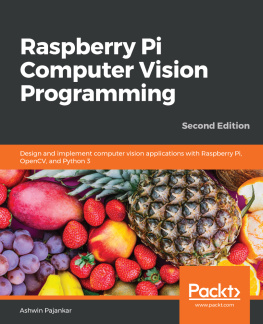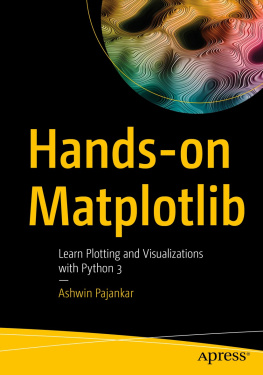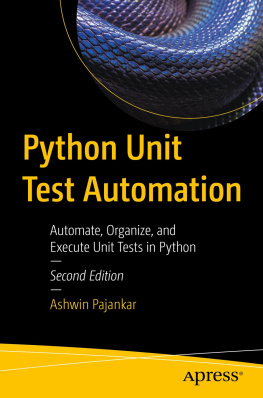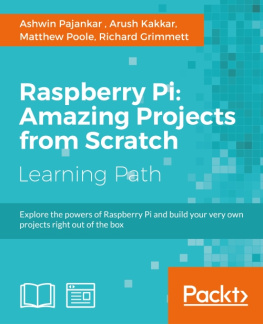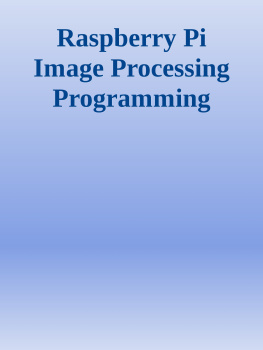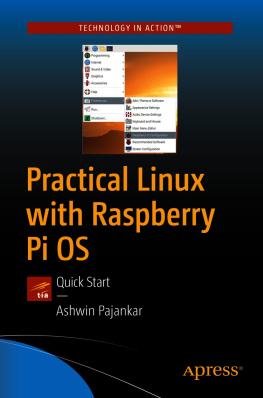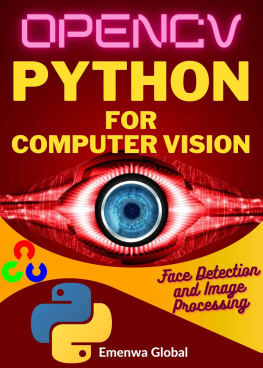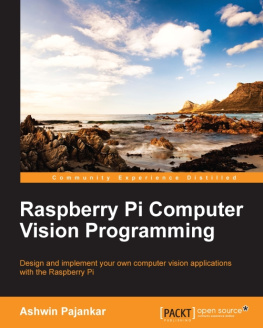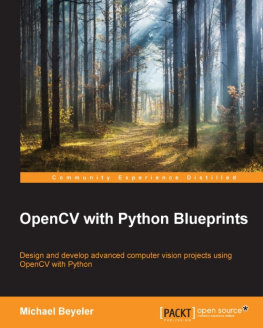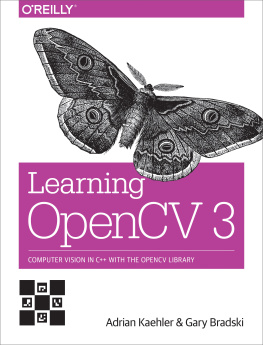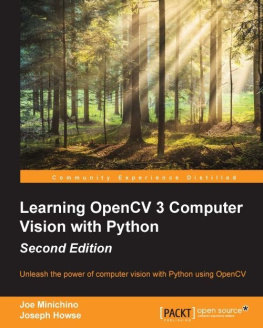Ashwin Pajankar - Raspberry Pi Computer Vision Programming: Design and implement computer vision applications with Raspberry Pi, OpenCV, and Python 3, 2nd Edition
Here you can read online Ashwin Pajankar - Raspberry Pi Computer Vision Programming: Design and implement computer vision applications with Raspberry Pi, OpenCV, and Python 3, 2nd Edition full text of the book (entire story) in english for free. Download pdf and epub, get meaning, cover and reviews about this ebook. year: 2020, publisher: Packt Publishing, genre: Home and family. Description of the work, (preface) as well as reviews are available. Best literature library LitArk.com created for fans of good reading and offers a wide selection of genres:
Romance novel
Science fiction
Adventure
Detective
Science
History
Home and family
Prose
Art
Politics
Computer
Non-fiction
Religion
Business
Children
Humor
Choose a favorite category and find really read worthwhile books. Enjoy immersion in the world of imagination, feel the emotions of the characters or learn something new for yourself, make an fascinating discovery.
- Book:Raspberry Pi Computer Vision Programming: Design and implement computer vision applications with Raspberry Pi, OpenCV, and Python 3, 2nd Edition
- Author:
- Publisher:Packt Publishing
- Genre:
- Year:2020
- Rating:3 / 5
- Favourites:Add to favourites
- Your mark:
Raspberry Pi Computer Vision Programming: Design and implement computer vision applications with Raspberry Pi, OpenCV, and Python 3, 2nd Edition: summary, description and annotation
We offer to read an annotation, description, summary or preface (depends on what the author of the book "Raspberry Pi Computer Vision Programming: Design and implement computer vision applications with Raspberry Pi, OpenCV, and Python 3, 2nd Edition" wrote himself). If you haven't found the necessary information about the book — write in the comments, we will try to find it.
Perform a wide variety of computer vision tasks such as image processing and manipulation, feature and object detection, and image restoration to build real-life computer vision applications
Key Features- Explore the potential of computer vision with Raspberry Pi and Python programming
- Perform computer vision tasks such as image processing and manipulation using OpenCV and Raspberry Pi
- Discover easy-to-follow examples and screenshots to implement popular computer vision techniques and applications
Raspberry Pi is one of the popular single-board computers of our generation. All the major image processing and computer vision algorithms and operations can be implemented easily with OpenCV on Raspberry Pi. This updated second edition is packed with cutting-edge examples and new topics, and covers the latest versions of key technologies such as Python 3, Raspberry Pi, and OpenCV. This book will equip you with the skills required to successfully design and implement your own OpenCV, Raspberry Pi, and Python-based computer vision projects.
At the start, youll learn the basics of Python 3, and the fundamentals of single-board computers and NumPy. Next, youll discover how to install OpenCV 4 for Python 3 on Raspberry Pi, before covering major techniques and algorithms in image processing, manipulation, and computer vision. By working through the steps in each chapter, youll understand essential OpenCV features. Later sections will take you through creating graphical user interface (GUI) apps with GPIO and OpenCV. Youll also learn to use the new computer vision library, Mahotas, to perform various image processing operations. Finally, youll explore the Jupyter Notebook and how to set up a Windows computer and Ubuntu for computer vision.
By the end of this book, youll be able to confidently build and deploy computer vision apps.
What you will learn- Set up a Raspberry Pi for computer vision applications
- Perform basic image processing with libraries such as NumPy, Matplotlib, and OpenCV
- Demonstrate arithmetical, logical, and other operations on images
- Work with a USB webcam and the Raspberry Pi Camera Module
- Implement low-pass and high-pass filters and understand their applications in image processing
- Cover advanced techniques such as histogram equalization and morphological transformations
- Create GUI apps with Python 3 and OpenCV
- Perform machine learning with K-means clustering and image quantization
This book is for beginners as well as experienced Raspberry Pi and Python 3 enthusiasts who are looking to explore the amazing world of computer vision. Working knowledge of the Python 3 programming language is assumed.
Table of Contents- Introduction to Computer Vision and Raspberry Pi
- Prepare Raspberry Pi for Computer Vision
- Programming with Python 3, GPIO, NumPy, and Matplotlib
- Getting started with Computer Vision
- Basics of Image Processing
- Colorspaces, Transformations, and Thresholding
- Lets Make Some Noise
- High Pass Filters and Feature Detection
- Image Restoration, Quantization, and Depth Map
- Histograms, Contours, and Morphological Transformations
- Real-life Computer Vision Applications
- Wrapping Up with Mahotas and Jupyter Notebook
- Appendix
Ashwin Pajankar: author's other books
Who wrote Raspberry Pi Computer Vision Programming: Design and implement computer vision applications with Raspberry Pi, OpenCV, and Python 3, 2nd Edition? Find out the surname, the name of the author of the book and a list of all author's works by series.

